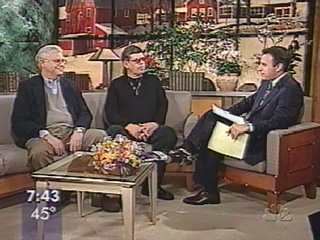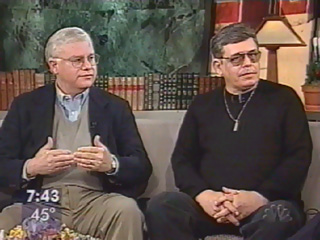
 div id="topback">back
div id="topback">back
January 11, 2000, Tuesday
NBC Television

MATT LAUER, co-host: Sixty-degree weather in New York City just last week. Violent
storms across Europe two weeks ago. And now the government says the 1990s were
the hottest decade in 1,000 years. It's enough to make us all wonder what's
going on. A new book, "The Coming Global Superstorm," by radio talk
show host Art Bell and Whitley Streiber makes a dire prediction that global
warming will eventually get so bad the result will be a catastrophic storm that
could destroy civilization.
Art Bell, Whitley Streiber, good morning.
Mr. ART BELL ("The Coming Global Superstorm"): Good morning.
Mr. WHITLEY STREIBER ("The Coming Global Superstorm"): Good morning.
LAUER: Fact or fiction? Is this nonfiction or is this fiction?
Mm. BELL: I would call it documented reality. There's a little bit of fiction there, but it's very well-documented. Very well-documented.
Mr. STREIBER: We're a little confused about it right now, because it started out as speculative fiction based on fact. But in the past few weeks, we don't know anymore. Maybe it's turning into fact before our eyes.
LAUER: It sounds like you're rounding the corners there right now. But do you believe the conclusions you draw in this book? That would make it fiction or nonfiction?
Mr. STREIBER: The basic conclusion is that sudden climate change is the real issue.
Mr. BELL: It's occurred before.
Mr. STREIBER: Yeah.
Mr. BELL: It's going to happen again. They found the woolly mammoths with the green stuff undigested in the arctic.
Mr. STREIBER: In their mouths.
Mr. BELL: In their mouths. It came from somewhere. It was growing. They ate it. They froze instantly.
LAUER: All right. But before we don our chicken suits and yell 'The sky is falling,' let's talk about specifically the storms you talk about in this book and this coming global superstorm. Describe it for me. What's going to happen?
Mr. STREIBER: OK. We talk about a couple of things. First, as the North Atlantic current drops south, there will be an upheaval in the weather. Will it develop into one single, huge storm? We don't know.
LAUER: But worse-case scenario, in your opinion, it could?
Mr. STREIBER: If there's enough energy collected in the atmosphere from global warming when that happens, yes.
Mr. STREIBER: Worst-case scenario is the right way to put it.
LAUER: Well, let's talk about the worst-case scenario. According to the book, it's a storm that could last six weeks and make a nuclear war seem tame?
Mr. STREIBER: Yes.
LAUER: Your words. This storm would cover a quarter of the globe with ice. It would result in unprecedented death tolls and mass destruction. Here's one that will get people's attention here in the US. The US could lose three-fifths of its population.
Mr. BELL: There would be a mass migration to the south.
Mr. STREIBER: Right.
Mr. BELL: There would have to be. You'd see precursor events, like, just occurred in France and Germany. Three hundred million trees just came down in France in this last storm. Hundred and forty-mile-per-hour straight winds in Germany.
LAUER: Let's get something straight. Not a meteorologist?
Mr. BELL: No.
LAUER: Not a meteorologist?
Mr. STREIBER: No.
LAUER: Not a climatologist?
Mr. STREIBER: But informed amateurs who've worked hard...
LAUER: But not a climatologist?
Mr. STREIBER: No.
LAUER: Nor you?
Mr. BELL: Absolutely not.
LAUER: All right, so...
Mr. BELL: Talk show host.
LAUER: Where do you base this information?
Mr. BELL: Research. Certainly, if you take a look at history, we've seen these climate flips occur violently and quickly in the past. You don't have to be a climatologist to know that.
LAUER: We--we contacted a lot of meteorologists and climatologists.
Mr. BELL: I bet you did.
LAUER: Well-respected people. Here's what they said. 'While you are using correct data, your analysis of that data has drawn you to illogical and irrational conclusions.'
Mr. STREIBER: No, that's not true. I'll tell you why they said that. They said that because they don't believe there's enough energy in the atmosphere...
LAUER: Exactly what they said.
Mr. STREIBER: ...to create this storm.
LAUER: That the atmosphere can't sustain and hold enough energy to create the kind of storm you're talking about.
Mr. STREIBER: But every day that passes, the lower atmosphere gets warmer because heat's being retained. The upper atmosphere gets colder.
Mr. BELL: Mm-hmm.
 |
Mr. STREIBER: The model is changing. Our book is a wake-up call. Maybe this won't happen. But the point is, we need science to be able to tell us what's going on right now, because the weather's changing so fast.
LAUER: But is it a wake-up call that comes real close to being a document that will just plain scare people?
Mr. STREIBER: It should scare people.
Mr. BELL: It should scare people. And it's not sufficiently scaring people yet. So the book is just, I think, publication date is actually today, though it's been out. It should scare people. People should be scared. Whitley and I disagree in one area. Whitley thinks that it can be mitigated to a great degree by human action. I don't think so. It's happened in the past before humans walked substantially and had industrial civilization. It's going to happen again.
LAUER: Mitigated by human action, meaning we cut down on the cars we drive, things like that?
Mr. STREIBER: There's a list of things in the book that any individual can do that are not intrusive into your life at all, that if everyone did them, would substantially reduce global warming.
Mr. BELL: Did you know, for example, that 40 percent of the arctic ice over the last two decades has melted? This is something we didn't know because our submarines were monitoring all this during the Cold War. Now we know. Forty percent of the arctic ice...
LAUER: But the contradiction there, Art, is, if you're saying we're getting warmer and warmer, yet you're predicting a storm that could cover a quarter of the globe with ice, it seems like those two things are at odds with one another.
Mr. BELL: Right. They are, in fact. But one precipitates the other.
Mr. STREIBER: The other. What happens is this. The ice melts, it floods the northern oceans with fresh water. This causes the temperature of the water to rise more quickly in the summer. The temperature between the arctic and the southern oceans becomes too much similar. The current stops flowing and suddenly you have a snapback into a situation where it's very cold.
LAUER: Let me--and I don't have to tell you, and I certainly don't have to remind the people who listen to your show every night--you spent an awful lot of time last year talking about the impending Y2K doom.
Mr. BELL: Mm-hmm.
LAUER: Let's be honest. Didn't happen.
Mr. BELL: I absolutely did.
LAUER: Didn't happen. So do you run the risk of sounding like the--the radio host who cried wolf here when you come out with a book like this?
Mr. BELL: Kind of like I have egg on my face.
LAUER: Just that you've come up with another doomsday scenario.
Mr. BELL: We've spent worldwide, $ 250 billion on Y2K. So it was an event that was warned about and was mitigated. I assume that you own a home. You probably pay insurance. When your house doesn't catch on fire and burn down, you do feel like you have egg on your face when you pay the insurance premium?
LAUER: You're saying I'd better go out and pay my insurance on this one?
Mr. BELL: Well, I think that's it, yes.
LAUER: The book is called "The Coming Global Superstorm." Art Bell, Whitley Streiber, good to see you, gentlemen.
Mr. STREIBER: Good to see you.
Mr. BELL: Thank you.
LAUER: By the way, if you'd like to read an excerpt from this book, you can log on to our Web site at today.msnbc.com. And we're back with more on a Tuesday morning right after these messages.